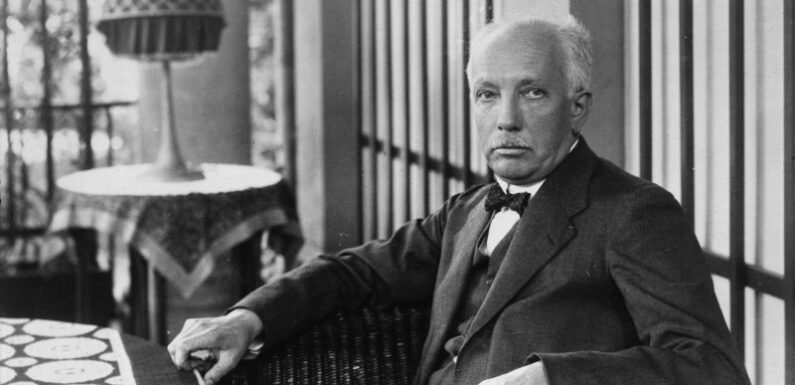
Save articles for later
Add articles to your saved list and come back to them any time.
Words or music – which is more important in opera? This age-old and rather civilised debate is the theme of Richard Strauss’s wistful and quirky comedy Capriccio.
It receives a single semi-staged performance by Victorian Opera and the orchestra of the Australian National Academy of Music, conducted by one of the world’s leading Strauss specialists, Simone Young, at the Palais Theatre on August 31.
Conductor Simone Young is one of the world’s leading Strauss specialists.Credit: Jay Patel
Oddly, perhaps, for such a noted Strauss expert – in 2023 she is also conducting Salome in Paris, Elektra in Vienna and Der Rosenkavalier at the Met in New York – this will be the first time she has performed Capriccio.
“I didn’t make friends with it for many years,” Young says. “I first saw it in Salzburg in 1986 and thought it was one of the most ravishing things I’d seen or heard, and started studying it.”
Richard Strauss in Venice in 1931.Credit: Wide World Photos
Capriccio, set in the 1920s, is the story of two suitors – the composer Flamand and the poet Olivier – trying to win the affections of a young widowed countess by the virtues of their art. All sorts of distractions and events happen around their rivalry, but it is a very philosophical, conversational opera.
Young could not reconcile how Strauss in Munich in 1942 was writing a decorative conversation piece, given what was going on around him.
“But in fact, he was writing despite the horror of the Second World War, and creating a little idealised homage to the salons of the turn of the century, and was resigned to the fact that this time would never come again.”
Young says Capriccio is very different from Strauss’ other operas, being written by a man who knew death was close. “It is the culmination of many things, and like many great composers – Verdi with Falstaff and Wagner with Meistersinger – he waited to the end to write his best comedy.”
There’s a huge amount of irony and introspection about what makes a great composer, a great poet, a great opera, and he pricks the balloon of pretension, she says.
“He’s basically just holding up a mirror to the society he was at home in, and it often comes quite close to what we’re familiar with. We might not have counts and countesses, but we have sponsors who are kings and queens of society, and can command, commission and control the output of young composers and writers, whose fate rests in their hands.”
So how does one become a Strauss specialist? It starts, Young says, with playing a lot of lieder by Strauss and Mahler. She could not imagine conducting Strauss without conducting Mahler – they share the same late Viennese romantic sound, both started writing for the voice and piano, and use the voice impeccably.
You play it a lot and you draw on it, you learn from one opera and it becomes part of your vocabulary for the next one. “It’s like the difference between being a 1500-metre freestyler and a 50-metre freestyler. I’m a long-distance opera conductor.”
Although the Sydney-raised Young is back in the country as chief conductor of the Sydney Symphony Orchestra and loves spending time in Australia, it is quite a coup for the Victorian Opera and ANAM to secure her services.
In fact, ANAM was the lure. She has had a long relationship with the academy, regularly doing concerts, workshops and public conversations, and she is also a long-standing friend of VO’s Richard Mills.
Conductor Simone Young (centre) with singers Deborah Humble, Samuel Dundas, Michael Schade and Vida Vida Miknevičiūtė, who will perform Strauss’ Capriccio.Credit: Simon Schluter
She also enjoys working with students or young professionals. “Working on an opera of this complexity and difficulty is always going to be a challenge, but the process is different when you are working with young professionals, because you’re hoping not just to teach them this score, you want to provide them with some skills for this repertoire they will be able to apply in other works.
“So rehearsals become a little more of a workshop. I find that quite enjoyable, very rewarding in its own way. Every now and then, we crusty old professionals need to get a taste of the enthusiasm and optimism of youth.”
Young has loved the score since that 1986 Salzburg production. “I’ve studied it on and off for years, I’ve coached it, I’ve lived with it, I’ve been deeply disappointed with many performances I’ve seen of it and I’ve always refused to do it until I felt the circumstances were right.”
And at last, the circumstances are right, with a young orchestra and singers performing their roles for the first time, so together they can create an interpretation from the ground up, which she finds really satisfying.
So, finally, which first – words or music? “I will sit on the fence like the countess. It is the synthesis of the two that creates the magic.”
Capriccio will be presented by Victorian Opera at the Palais Theatre on August 31.
Find out the next TV, streaming series and movies to add to your must-sees. Get The Watchlist delivered every Thursday.
Most Viewed in Culture
From our partners
Source: Read Full Article


